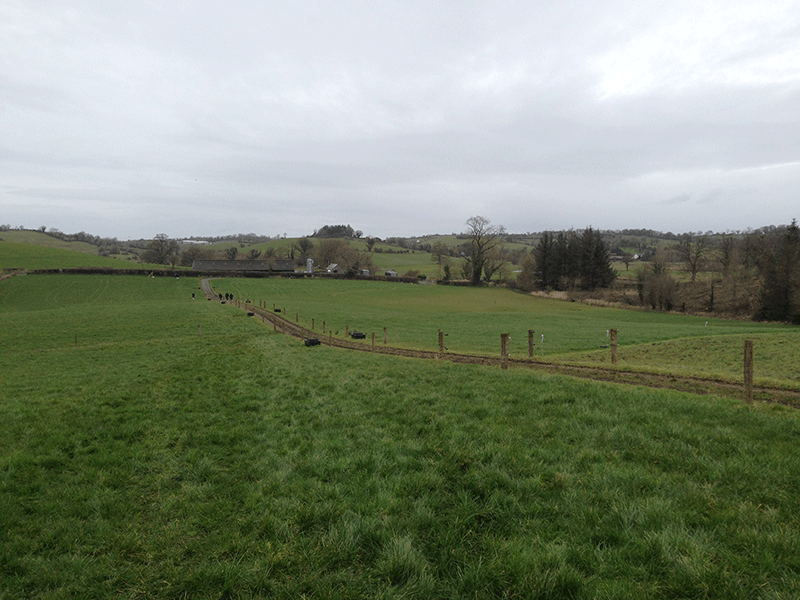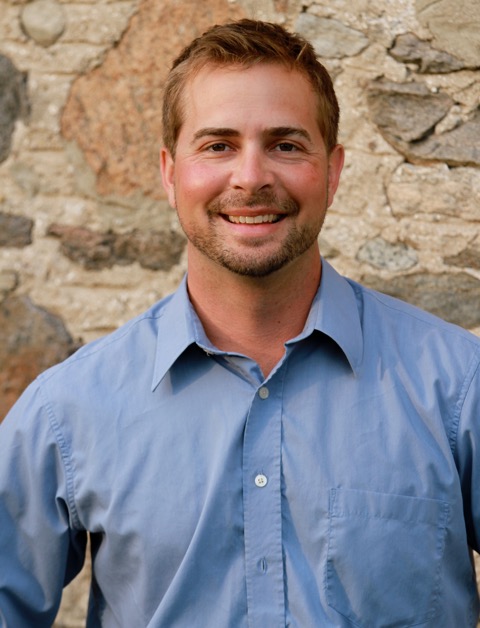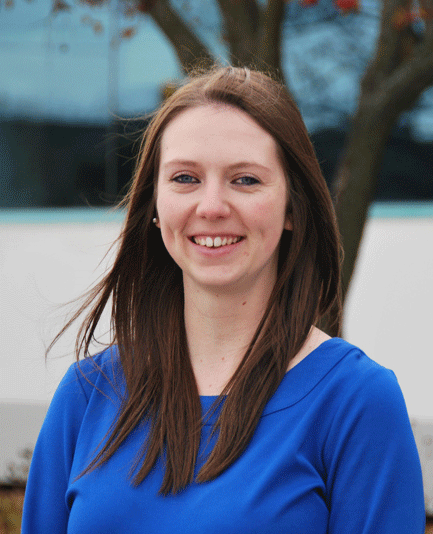Nuffield scholar
RESEARCH AND LEARNING
JUST UNDER A year later, Tony Balkwill continues to embrace the opportunity the Grain Farmers of Ontario Nuffield Scholarship provided him — a chance to develop historical soil-type maps into field-scale management zones. Not only has the Nuffield Scholarship expanded Balkwill’s research, but the international stage comes with unique lessons.
PHOTO: NUFFIELD CONFERENCE IN IRELAND. BALKWILL IS STUDYING THE DEVELOPMENT OF FIELD-SCALE MANAGEMENT ZONES.

“Agriculture is no longer just local, but also international,” says Balkwill of some of the important takeaways from his scholarship. “You still have your family farms, but we also have a world influenced industry where people have many of the same issues everywhere, which is humbling.”
As a Nuffield Scholar, Balkwill will visit a number of international countries to both research and learn over a two year period. Balkwill’s journey with Nuffield started with a trip to the United Kingdom to visit Rothamstead, the longest running agriculture research station in the world. Here Balkwill met with growers, but was also able to access seed vaults from the 1600s and wheat fields dating back to the 1800s.
Balkwill then attended a weeklong Nuffield conference in Ireland. This conference was an opportunity to integrate with and discuss research from scholars across the world. Exercises include having dialogues with individuals with a range of agriculture backgrounds from many countries.
“I was able to sit with a beef farmer from Australia,” says Balkwill of the networking opportunities the Nuffield scholarship gave him. “Everyone was open-minded and it was an opportunity to bounce ideas off of people from other sectors and countries.”
Balkwill’s international journey started in July 2015 when he received the Nuffield Scholarship sponsored by Grain Farmers of Ontario. The scholarship is awarded to an Ontario grains and oilseed producer, and gives them the opportunity to study internationally. To be considered for the scholarship, individuals demonstrate how their study will benefit the Ontario grains sector.
Scholars gain access to the best production, management, and marketing systems in the world, and to a growing international Nuffield network that spans the globe. Nuffield Scholars are much sought-after employees, speakers, board members, advisors, and mentors.
“The scholarship opens you up to the world of agriculture and contacts,” explains Balkwill who identified the networking opportunities as one of the best parts of the scholarship. “There is a pretty impressive institution in place internationally with a variety of resumes.”
The international aspect of Nuffield started nearly 30 years ago with Lord Nuffield who wanted to help those in the agriculture sector expand their knowledge. He took local farmers and had them travel to bring knowledge back home — that legacy continues today.
RESEARCH PLANS
Balkwill hopes the scholarship will assist him in developing field-scale management zones. But why did he choose this?
Balkwill explains that climate, management, and soil drive yield. Climate cannot be changed and management can vary, but he identifies soil as the part of the equation that needs further knowledge and investigation.
Balkwill feels that fertility is important, but soil tests only show eight inches of the equation. And the question is what does the rest of the soil look like? The answer is looking to soil cores. Soil cores are much deeper and more diverse than what is found in a soil test of those first eight inches.
Soil types like clay and sand are already being talked about, but even those styles can vary from farm to farm. As well, the old provincial standard of soil typing shows three types, but Balkwill’s research has identified nine.
Balkwill plans to use historical soil type maps. Although they are not accurate geo-spatially, Balkwill says the historical maps do a good job of identifying soil. “With field specific spoil type maps, soil can change even every 50 feet and this can have a 100 bushel difference,” explained Balkwill during his presentation to delegates at the Grain Farmers of Ontario Semi-Annual Meeting. Yield maps are not enough.
“We need to start looking from the bottom up, not the top down,” explains Balkwill about yield being a reflection of management and soil type performance. “Yield means absolutely nothing if you are losing money, 250 bushels can be really expensive or it can be really profitable.”
The key is to look to the economics — 150 bushels can make a lot of money if it did not cost anything. The key is to look to the soil, decide what to apply, and how to plant the seeds. “Variable rate farming and precision agriculture will not make farms even, it will make them more variable, but the profitability per zone will increase,” explains Balkwill.
Agronomists like Balkwill are already doing soil maps to the acre, but he feels there is much more to learn, which the scholarship is allowing him to do.
“For growers it is very appealing to get precision agriculture on farms,” said Balkwill. “They want to get it done, but they don’t know how to go about it.”
Is it investment? Government? “This scholarship is opening up a monumental opportunity,” said Balkwill on precision agriculture getting the conversation going. “Farmers want it, they know they have variability, having a protocol is the next step, but they need the management.”
The scholarship is helping with soil foundations and management. Travelling has given Balkwill the opportunity to see what others are doing with variable rate management, including learning more about zone building.
NEXT STEPS
Balkwill plans to continue extending his active role in precision agriculture internationally. With the United Kingdom and Ireland trips complete, Balkwill’s next step is studying in Australia during winter 2016-2017. He plans to study soil visibility mapping with a visit to Deakin University in South Wales. Balkwill is also considering a trip to East Africa to look at farming previously undisturbed soils and what the performance differences are. He will wrap up his study with trips to the mid-western United States and Western Canada.
PHOTO: TONY BALKWILL.
 Tony Balkwill, Grain Farmers of Ontario’s sponsored Nuffield scholar, will be at the Grain Farmers of Ontario tent at Canada’s Outdoor Farm Show on September 13 from 1 p.m. – 4 p.m. to talk with farmers about his precision agriculture research and participation in the Nuffield program.
Tony Balkwill, Grain Farmers of Ontario’s sponsored Nuffield scholar, will be at the Grain Farmers of Ontario tent at Canada’s Outdoor Farm Show on September 13 from 1 p.m. – 4 p.m. to talk with farmers about his precision agriculture research and participation in the Nuffield program.
 2017 NUFFIELD SCHOLAR SELECTED
2017 NUFFIELD SCHOLAR SELECTED
Grain Farmers of Ontario is pleased to announce Nicole Mackellar, as the recipient of the 2017 Grain Farmers of Ontario sponsored Nuffield Scholarship. Mackellar plans to use the scholarship to study the possibilities for branding of commodities that are further processed into ingredients.
With a push from consumers to buy local, Mackellar plans to use the Nuffield Scholarship to study methods to brand end-use products, so they are recognized as containing Ontario grains. She will look to other countries, like Australia, to develop the best model to increase both domestic and export sales.
“The Nuffield scholarship will allow me to connect with colleagues around the world and apply that to Ontario to help increase utilization and market share of Ontario grains,” says Mackellar. “This opportunity would not be possible without Nuffield Canada and Grain Farmers of Ontario.”
Mackellar obtained her honours BA from McMaster University specializing in economics and psychology. She has nearly a decade of experience in the marketing industry and now works as manager of market development for Grain Farmers of Ontario. Mackellar grew up on a beef and cash crop farm in Middlesex County, and continues to be active in its operations during the busy spring and fall seasons.
The Grain Farmers of Ontario sponsored Nuffield Scholarship is valued at $15,000. To be considered for this scholarship, individuals must demonstrate that their study will benefit the Ontario grains sector and community. •























